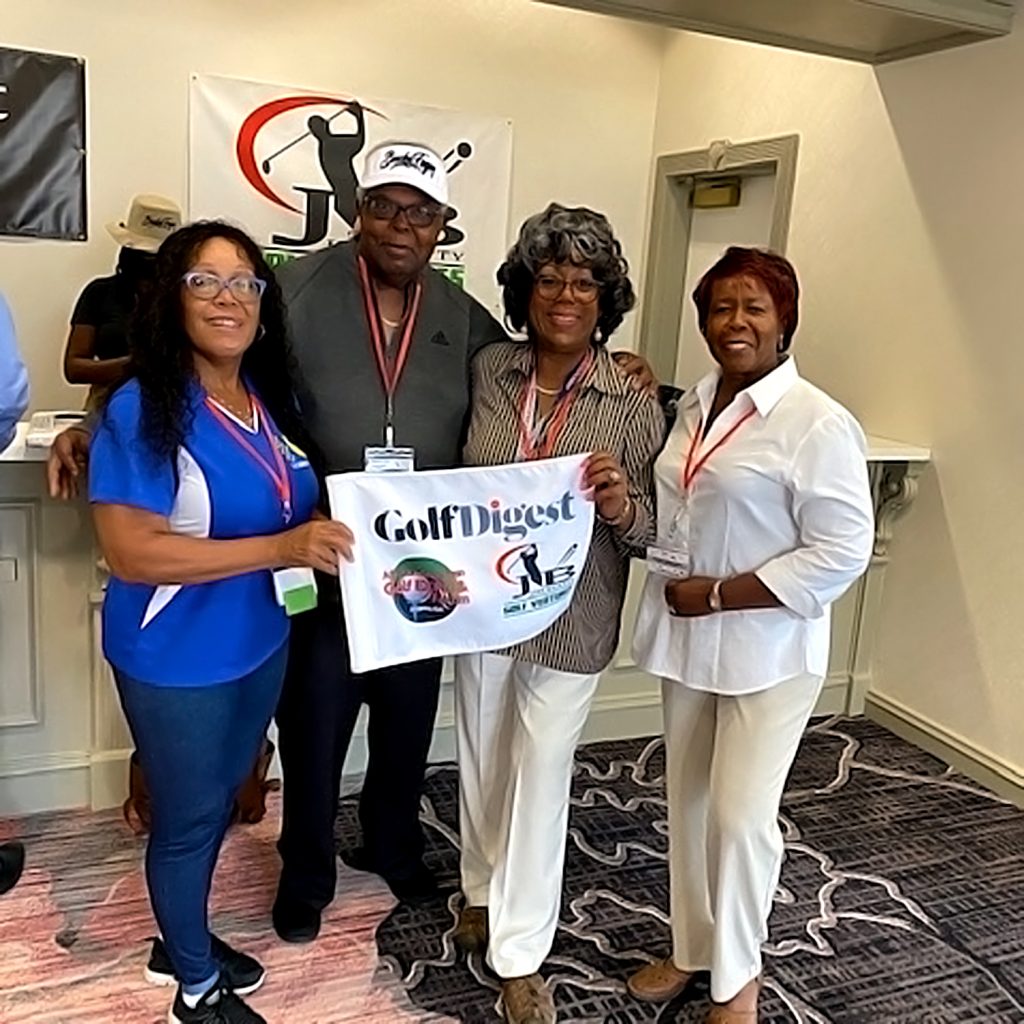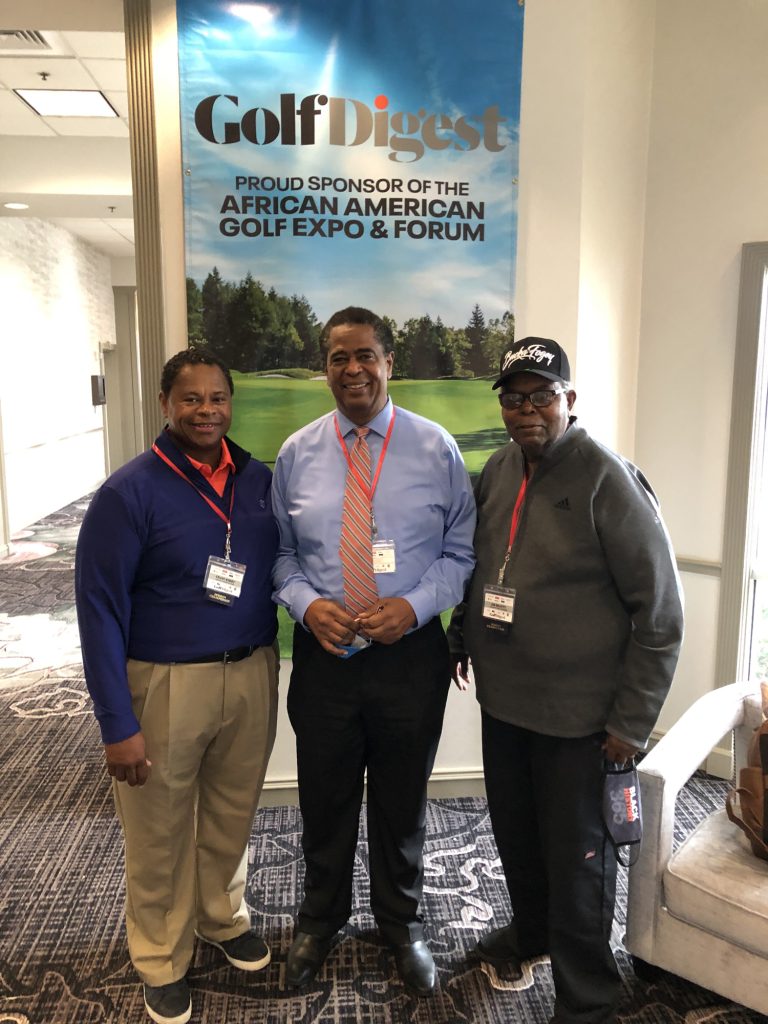By Allen R. Gray
NDG COntributing Writer
When entrepreneur Arnett Gill left his Dallas home of 36 years bound for Nashville, TN he left a piece of himself here in Dallas. Now he is seeking to make his connection to his home city known in a most impactful but nontraditional way—through the game of golf.
Gill and associate EXPO founder and organizer ,Jim Beatty of Jim Beatty Golf Ventures will be hosting The African American Golf Expo and Forum in Charlotte, NC in late August 2022, the second annual EXPO offering in a series of forums and exhibitions geared to the needs and concerns of African Americans. Their Gill’s sites is are now set on bringing the EXPO or similiar event to the Dallas area and involve one of the few golfing facilities owned by African Americans, The Golf Club of Dallas.
Beatty’s in-depth knowledge of the industry along with Gill’s understanding of the climate of the Dallas area could lead to a whole new avenue of economic development and involvement in a sport Blacks tend to overlook.

“Dallas has the space and the demographics to house such a unique expo,” says Gill.
Surely, golf is not a game African Americans are particularly known for, but the rich history between Black golfers and a game—that is as has been restrictive as white-only pies—runs nearly as deep as the history of the game itself.
Most notably are John Shippen (1879-1968) the son of a former slave, who became so proficient at the game that he began giving lessons to Shinnecock Hills Golf Club members at age 16. Shippen came in fifth at the second ever U.S. Open in 1896; and he was fifth in the 1902 U.S Open.
Then there is the man credited with being the Jackie Robinson of golf, Theodore Rhodes (1913-1969). Rhodes played in the U.S. Open 1948, becoming the first African American to be recognized as a professional golfer.
Yet, the accomplishments of Shippen and Rhodes did not go without being marred by the hatred of their respective eras. Both men faced the brutality of racism head-on as some white golfers refused to play in a tournament that was not segregated. Rhodes even sued the Professional Golfers’ Association of America (PGA), seeking removal of its “Caucasian only clause”. Rhodes won in an out of court settlement, but the PGA quickly changed all its tournaments to “invitationals” where only whites were invited.
Gill and Beatty, avid golfers, appreciate the rich history of the game they so cherish, and the contributions African Americans made to the sport, but their ultimate interest in the game extend beyond the course and into the boardroom.
“Decisions are made in C-suites. Are we there? Decisions are made by boards of directors. Are we there?” Beatty asks rhetorically. Beatty says that less than 3% of boards and C-suite positions are occupied by people of color, yet people of color are being asked to embrace the golfing industry. Beatty says that in order to be genuinely included in the industry there needs to be more of “us” in positions of authority and decision-making.
Beatty emphatically states that, “It all gets back to that adage: ‘Money talks.’”

(Courtesy photo)
In 2016, a report commissioned by the World Golf Foundation on the sports’ economic activity revealed that in the U.S. alone golf generates a robust income of $84 billion, which is an increase of 22% since 2011. One golfing business insider predicts that golf’s 2022 U.S. economic activity total is at or beyond $100 billion.
The PGA officially removed its “Caucasian only clause” in 1961, but when it comes to the economic aspect of the sport it has been predominantly exclusively Caucasian only.
According to industry statistics there are 9,473 golf courses and country club businesses in the U.S. in 2022. Only 13 or so golfing facilities are owned by African Americans. One of those African American-owned facilities is here in Dallas. The Golf Club of Dallas is owned by Oak Cliff Bible Fellowship Church (OCBF), where Gill was once a member.
Gill says his close association with Dallas and OCBF is why he and business associate Beatty hope to sponsor economic diversity in a sport that has 24 million recreational participants, but only 3% or so are African American.
Beatty, who has some ties to PGA boards, knows what financial opportunities golf can provide to African Americans.
“Numbers don’t lie,” Beatty insists. “If this is such a great industry—$84 billion—all of your (PGA) slogans say you want involvement and you want to see women and minorities of all sorts, all colors involved, then show me how truthful you are with that.
The dollars are there to be had, unfortunately, the doors of economic inclusion have remained shut to African Americans.
The statistics from the 2016 report are what spurred Beatty and his associates to develop the first African American Golf Expo and Forum that was held last year in Atlanta, GA.
“Before that we have never had one forum dedicated to people of color,” Beatty informs.
“The PGA has a national merchandise show each year in Orlando, FL, for buyers of golf products such as golf clubs or apparel with which to stock their pro shops,” says Beatty, “but never anything to talk to the concerns of Black folk.”
The first African American Expo and Forum in Atlanta revealed the possibilities of what might be. The event drew more than 450 “unique individuals” over the four days of the event, with an economic impact of over $750,000. This year’s African American Golf Expo and Forum in Charlotte already has an increased number of attendees, and the economic impact in the city is expected to be in the millions.
In its own way, golf has the ability to say something about the wealth distribution as well as the racial divide in our nation.
“Up until 1961, there was a Caucasian-only clause in the PGA…You had to be white in order to play professionally,” Beatty reminds us. “There are only 4 Black players listed on the PGA tour roster.
“The overall cost for a player in the junior golfing ranks ranges anywhere from $20,000 to $80,000 per year for equipment, coaching, travel, lodging and entry fees.
“To play the game of golf you have to have the (financial) wherewithal,” Beatty states. He also cautions, “It’s not just the playing, it is also the $84 billion business of golf. If you have ever been to a golf tournament—if you’ve been to a golf course—they sell food, apparel, hats…We (African Americans) need to be a part of that.”
Still, sometimes change is only ignited by strange and unusual circumstances. Beatty said that witnessing the murder of George Floyd in 2020 not only sparked protests unlike the nation had ever witnessed, it also caused PGA board members to take a long hard look in the mirror—and at how or if they might be contributing to the systemic racism that plagues our nation.
Golf isn’t going anywhere anytime soon. Golf is big business in the United States…but it is even bigger business in the United Kingdom and continually growing in other nations the world over.
Globally, the total number of golfers has grown from 61 million to over 67 million, which includes club members, independent golfers and those who frequent driving ranges. That means more money is being generated. That also means a golf expo and forum in Dallas would bring more money locally.
“An African American Golf EXPO expo and forum would allow the golfing business interest to understand that we are demanding a seat at the table and our slice of the $100 billion (United States) industry,” Gill insists.
With respect to African American participation in the whole of the golfing industry, Gill and Beatty will have everyone know: “We Play, We Pay, We Count”.





This would be a great win for our city! I hope this happens.